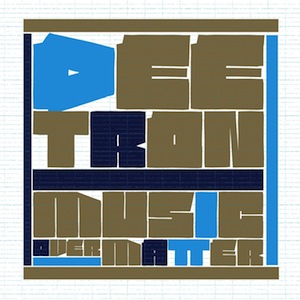Deetron Music Over Matter
It’s taken eight years, but Swiss techno producer Deetron (a.k.a. Sam Geiser) has finally released […]

It’s taken eight years, but Swiss techno producer Deetron (a.k.a. Sam Geiser) has finally released his sophomore album. In that nearly decade-long stretch, his sound has changed considerably, moving away from the Detroit-inspired sci-fi techno and deep house that characterized his work in the late ’90s and early ’00s. The past few years in particular have seen him embrace a more pop-oriented approach rooted in traditional songcraft, with collaborative works alongside artists like Seth Troxler and Hercules & Love Affair. Music Over Matter is an extension of this recent side of his discography, emphasizing these qualities by incorporating a large number of guest vocalists and co-producers to make an LP that feels like his most accessible to date.
With that said, it’s also his least cohesive record as well. Music Over Matter‘s 13 tracks are an incongruous grab bag, with solo cuts and new collaborative material sitting next to seemingly random odds-and-ends from the past few years. The gap in time, context, and style makes for a listening experience that feels almost like a DJ mix in the way it uses so many voices to convey its moods. This feeling is experienced right from the start, as the off-kilter R&B of “Thinking (feat. Cooly G)” melts into the synthesized nu-disco pop of “Crave (feat. Hercules and Love Affair),” a single from last year. Geiser’s background instrumentation ought to be a unifying factor here, but, for some reason, it’s not. He’s too much of a chameleon, choosing to change his own sound to match his collaborator as opposed to the other way around.
The collaborations that work best are those which see Geiser employing more complex arrangements. The best of these comes with “Rhythm (feat. Ben Westbeech),” the LP’s first single. It plays to Westbeech’s talents as a singer, carrying his direct and soulful vocals on a driving rush of ’90s house rhythms, lush piano chords, and swirling synth tones. The structure is intricate; the song builds and breaks down in all the right places, but somehow never feels obvious. Another instance of creative collaboration comes in “Insatiable (feat. Delvis),” which touches on Strictly Rhythm-style house revivalism, but goes beyond mere nostalgia thanks to the Belgian singer’s considerable vocal contortions.
Geiser proves to be a nimble shapeshifter over the course of Music Over Matter, but a few of the tracks on the LP feel like an attempt to re-skin previous works by his collaborators. For instance, “Love Song (feat. Seth Troxler)” sounds like a rehash of Art Department’s “Living the Life (feat. Seth Troxler),” especially with its similarly goofy monologue. Along the same lines, “Bright City Lights,” recorded with Fritz Kalkbrenner, would be a dead ringer for Kalkbrenner’s own folksy “Sky and Sand,” except that here, the German vocalist weirdly chooses to affect an Irish lilt, emphasizing an invisible “h” as he sings, “Bright city lights been gone/Hum and silence fills the h’early morn.”
Ultimately, the best moments on the LP come when Geiser is working alone. Within these tracks, there’s a sizable Detroit house influence; sampled bongos, MPC pads, and moody Rhodes chords recall European retellings of the sound in the vein of Trus’me and Motor City Drum Ensemble. The first instance of this is “Sing (Album Version),” a shortened, two-minute-teaser version of a track that first appeared as a seven-minute b-side on Geiser’s Troxler-featuring Each Step 12″ from 2010. Barring the length, it’s untouched, with warm vocal pads that rise up in rotating patterns through a current of churning disco percussion. This more overt classic-house style also colors “Can’t Love You More,” which appeared earlier this year as a single on his Character EP. It’s a muted affair, pushing its vocals and organ stabs beneath a warbling filter and plucky hits of guitar. Like “Sing,” it’s a compelling tune, but the success of these two tracks—and all of the previously released material on the LP—brings up a point about Music Over Matter as a whole: a fair amount of this album has been heard before, and the tracks that are new aren’t necessarily showcasing Deetron at his best.

